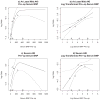Preoperative serum brain natriuretic peptide and risk of acute kidney injury after cardiac surgery
- PMID: 22322531
- PMCID: PMC3312808
- DOI: 10.1161/CIRCULATIONAHA.111.029686
Preoperative serum brain natriuretic peptide and risk of acute kidney injury after cardiac surgery
Abstract
Background: Acute kidney injury (AKI) after cardiac surgery is associated with poor outcomes and is difficult to predict. We conducted a prospective study to evaluate whether preoperative brain natriuretic peptide (BNP) levels predict postoperative AKI among patients undergoing cardiac surgery.
Methods and results: The Translational Research Investigating Biomarker Endpoints in Acute Kidney Injury (TRIBE-AKI) study enrolled 1139 adults undergoing cardiac surgery at 6 hospitals from 2007 to 2009 who were selected for high AKI risk. Preoperative BNP was categorized into quintiles. AKI was common with the use of Acute Kidney Injury Network definitions; at least mild AKI was a ≥0.3-mg/dL or 50% rise in creatinine (n=407, 36%), and severe AKI was either a doubling of creatinine or the requirement of acute renal replacement therapy (n=58, 5.1%). In analyses adjusted for preoperative characteristics, preoperative BNP was a strong and independent predictor of mild and severe AKI. Compared with the lowest BNP quintile, the highest quintile had significantly higher risk of at least mild AKI (risk ratio, 1.87; 95% confidence interval, 1.40-2.49) and severe AKI (risk ratio, 3.17; 95% confidence interval, 1.06-9.48). After adjustment for clinical predictors, the addition of BNP improved the area under the curve to predict at least mild AKI (0.67-0.69; P=0.02) and severe AKI (0.73-0.75; P=0.11). Compared with clinical parameters alone, BNP modestly improved risk prediction of AKI cases into lower and higher risk (continuous net reclassification index; at least mild AKI: risk ratio, 0.183; 95% confidence interval, 0.061-0.314; severe AKI: risk ratio, 0.231; 95% confidence interval, 0.067-0.506).
Conclusions: Preoperative BNP level is associated with postoperative AKI in high-risk patients undergoing cardiac surgery. If confirmed in other types of patients and surgeries, preoperative BNP may be a valuable component of future efforts to improve preoperative risk stratification and discrimination among surgical candidates.
Trial registration: ClinicalTrials.gov NCT00774137.
Conflict of interest statement
Figures




References
-
- Mangano CM, Diamondstone LS, Ramsay JG, Aggarwal A, Herskowitz A, Mangano DT. Renal dysfunction after myocardial revascularization: risk factors, adverse outcomes, and hospital resource utilization. The Multicenter Study of Perioperative Ischemia Research Group. Ann Intern Med. 1998;128:194–203. - PubMed
-
- Tuttle KR, Worrall NK, Dahlstrom LR, Nandagopal R, Kausz AT, Davis CL. Predictors of ARF after cardiac surgical procedures. Am J Kidney Dis. 2003;41:76–83. - PubMed
-
- Lassnigg A, Schmidlin D, Mouhieddine M, Bachmann LM, Druml W, Bauer P, Hiesmayr M. Minimal changes of serum creatinine predict prognosis in patients after cardiothoracic surgery: a prospective cohort study. J Am Soc Nephrol. 2004;15:1597–1605. - PubMed
-
- Coca SG, Peixoto AJ, Garg AX, Krumholz HM, Parikh CR. The prognostic importance of a small acute decrement in kidney function in hospitalized patients: a systematic review and meta-analysis. Am J Kidney Dis. 2007;50:712–720. - PubMed
Publication types
MeSH terms
Substances
Associated data
Grants and funding
LinkOut - more resources
Full Text Sources
Other Literature Sources
Medical

